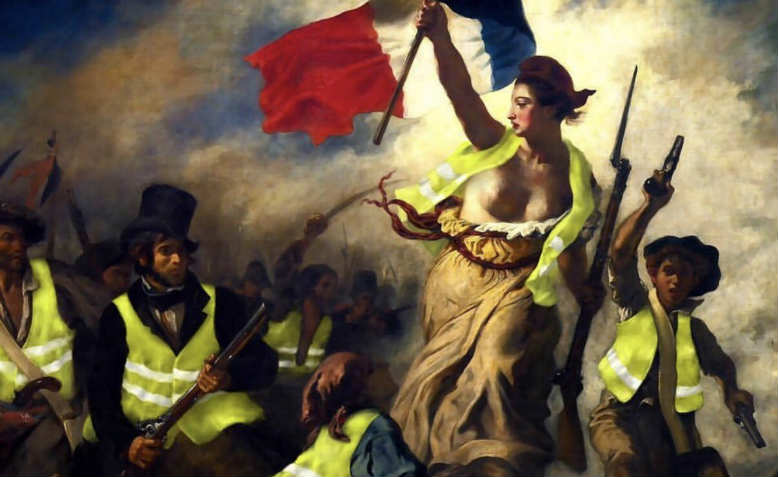 Photo: Wikimedia Commons
Photo: Wikimedia Commons
Out on the streets of France, hard-hit working people are furiously repudiating austerity, sham democracy, and the neoliberal programme of President Emmanuel Macron, reports Susan Ram
A tsunami is sweeping France, its colour a vivid fluorescent yellow. It erupts at motorway tolls and rural roundabouts; it spills into city centres, shape-shifting from orderly processions to barricade-building and feisty confrontations with heavily armed riot police. Since materialising as if from nowhere on November 17, 2018, and despite full-on, brutal state efforts to contain it, the movement of the Yellow Jackets (Gilets jaunes) continues to confront French President Emmanuel Macron with his gravest crisis yet.
It speaks volumes that this new movement, together with its symbolic marker – the yellow safety vest all motorists in France must carry in their cars – is already instantly identifiable across the world. What began as a protest against threatened fuel tax hikes following months of price rises at the pumps has morphed into a mass phenomenon of global reach: that of ordinary working people taking to the streets to repudiate austerity, obscene levels of inequality, sham democracy and the lie that There Is No Alternative (TINA) to neoliberalism.
The Yellow Jackets have already succeeded in applying the brake to Project Macron and wringing minor but symbolically important concessions from a President whose abysmally low standing in the polls speaks to his arrogance, aloofness and naked class interests.
Who are the Yellow Jackets? All the available evidence points to a fluid, broad-based movement of diverse composition. Workers represent the bulk of those participating, with small business owners, farmers, professionals and the retired also strongly represented. Women are particular stalwarts, in many cases engaging in political action for the first time. Unorganised workers such as artisans, home care workers, and self-employed nurses also feature strongly. These varied constituents are united by anger and a compelling desire to combat growing economic hardship and inability to influence events.
The complex composition of the Yellow Jackets movement, together with the lack of centralised leadership (mobilisation is conducted via social media), explains the diversity of its demands. These range from calls for Macron’s immediate resignation to demands for lower taxes for ordinary people and the reinstatement of the wealth tax on the country’s super rich (which Macron abolished soon after becoming president in 2017). Another key demand is for the overturning of France’s top-down political decision-making process by enabling citizens to initiate referendums on important questions of the day.
Unorthodox, anarchic and as yet somewhat wary of traditional organisations of the left, whether trade unions or political parties, the Yellow Jackets nevertheless have shown formidable staying power. Since first hitting the streets, tolls, roundabouts and motorways in mid-November, they have kept the French state on its toes Saturday after Saturday, never relenting, never yielding, even for Christmas and the New Year. No part of France — whether the glitzy Champs-Élysées in downtown Paris, or big regional cities such as Bordeaux, Nantes, Rouen, Caën and Toulouse, or small communities off the tourist map — has been left untouched by their electrifying presence. Neither bitter winter weather nor the extraordinarily violent response of the French security state (whose routine use of high velocity ‘non-lethal’ weapons has left scores of protestors maimed or grievously injured) has driven them off the streets.
Whatever its ability to sustain the extraordinary momentum built up over just a few short weeks, the Yellow Jackets movement provides a living, breathing and gloriously defiant model of how to fight for a better future. Expressing the anger, determination and creativity of hundreds of thousands of hard-hit working people, it offers solidarity, hope and a way forward. It reminds us, compellingly, that — together – we have the power to shape our own destiny.

